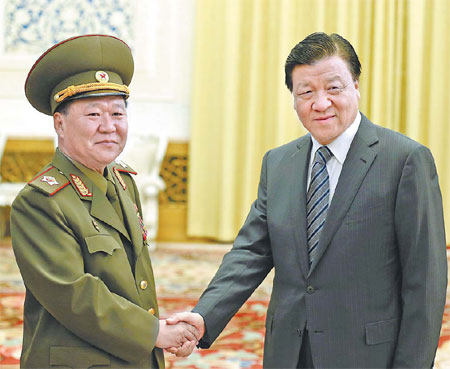Pyongyang 'to heed Beijing'
Updated: 2013-05-24 07:12
By Li Xiaokun and Pu Zhendong (China Daily)
|
||||||||
|
Liu Yunshan, a member of the Standing Committee of the Political Bureau of the Communist Party of China Central Committee, the Party's core leadership, meets Choe Ryong-hae, a special envoy of DPRK leader Kim Jong-un, on Thursday in Beijing. Wu Zhiyi / China Daily |
DPRK is willing to take China's advice to engage in dialogue
Pyongyang is willing to take Beijing's advice to engage in dialogue on the Korean Peninsula issue, a visiting special envoy of the Democratic People's Republic of Korea top leader Kim Jong-un said on Thursday.
The envoy said his country wants to focus on economic development and needs a peaceful external environment for that aim, adding that his visit aims to consolidate ties with Beijing.
Pyongyang observers said the suggested softened stance would break a months-long impasse on the peninsula.
The envoy, Director of the Korean People's Army's General Political Bureau Choe Ryong-hae, made the remarks in a meeting with Liu Yunshan, a member of the Standing Committee of the Political Bureau of the Central Committee of the Chinese Communist Party.
Beijing "expects all parties involved to stick to the goal of peninsula denuclearization and keep maintaining peace and stability on the peninsula", Liu said, according to a statement issued by China after the meeting.
He asked the countries concerned to "take concrete action to ease tensions, actively push forward dialogue and consultation and restart the Six-Party Talks at an early date".
These talks, initiated in 2003 in response to the DPRK withdrawing from the Nuclear Non-Proliferation Treaty, involve the DPRK, the Republic of Korea, China, the United States, Japan and Russia. In April 2009, the DPRK, irritated by a UN Security Council resolution to impose more sanctions on Pyongyang for a nuclear test, left the talks and resumed its nuclear weapons program.
Liu also told Choe that "consolidating and developing friendly ties between China and the DPRK is the consistent stand of the CPC and the Chinese government".
Beijing wants to strengthen communication with Pyongyang, expand consensus and push forward ties, Liu said.
Choe said Kim's aim in sending him to China is to "improve, consolidate and develop DPRK-China relations".
He said Pyongyang appreciates Beijing's efforts on maintaining stability on the Korean Peninsula and pushing the peninsula issue "back to the channel of consultation".
"The DPRK hopes to concentrate on developing the economy and improving people's livelihoods, and it is willing to create a peaceful external environment," said Choe, a member of the Presidium of the Political Bureau of the Workers' Party of Korea Central Committee.
Shi Yongming, an Asia-Pacific studies researcher at the China Institute of International Relations, said Choe has sent a signal that Pyongyang is wiling to talk, and this will have a vital impact on the peninsula issue.
"Since Pyongyang held its third nuclear test in February, the situation on the peninsula has changed," Shi said.
Tensions escalated on the peninsula after Pyongyang's nuclear and missile tests, which saw international sanctions tightened.
Choe's visit will enable Pyongyang to have in-depth talks with Beijing, to avoid misjudging the situation, Shi said.
"China is, so far, the only country in the world that can have in-depth talks with the DPRK, and high-ranking exchanges between the two neighbors have been a necessary step in breaking the impasse on the peninsula."
However, Shi said it is hard to see the Six-Party Talks resuming anytime soon.
Zhang Liangui, a Korean studies researcher at the Party School of the CPC Central Committee, said that although there has been an obvious improvement, judging by the envoy's remarks, there is no sign that Pyongyang is about to make any change in its nuclear policies.
Contact the writer at lixiaokun@chinadaily.com.cn
(China Daily USA 05/24/2013 page1)

 Michelle lays roses at site along Berlin Wall
Michelle lays roses at site along Berlin Wall
 Historic space lecture in Tiangong-1 commences
Historic space lecture in Tiangong-1 commences
 'Sopranos' Star James Gandolfini dead at 51
'Sopranos' Star James Gandolfini dead at 51
 UN: Number of refugees hits 18-year high
UN: Number of refugees hits 18-year high
 Slide: Jet exercises from aircraft carrier
Slide: Jet exercises from aircraft carrier
 Talks establish fishery hotline
Talks establish fishery hotline
 Foreign buyers eye Chinese drones
Foreign buyers eye Chinese drones
 UN chief hails China's peacekeepers
UN chief hails China's peacekeepers
Most Viewed
Editor's Picks

|

|

|

|

|

|
Today's Top News
Shenzhou X astronaut gives lecture today
US told to reassess duties on Chinese paper
Chinese seek greater share of satellite market
Russia rejects Obama's nuke cut proposal
US immigration bill sees Senate breakthrough
Brazilian cities revoke fare hikes
Moody's warns on China's local govt debt
Air quality in major cities drops in May
US Weekly

|

|








